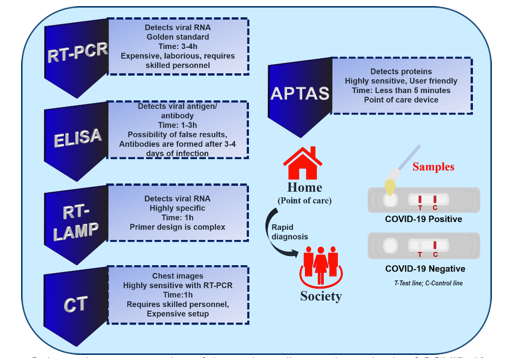VIT to develop aptamer-based POC diagnostic kit for COVID-19
April 08, 2021 | Thursday | News
The diagnostic kit is fabricated with nanoparticles
Image caption- Schematic representation of the various diagnostic methods of COVID-19
A research team from the Vellore Institute of Technology (VIT) has recently bagged a project, funded by the Science and Engineering Research Board (SERB) of the Department of Science & Technology (DST), to develop an aptamer-based point-of-care (POC) diagnostic kit for the detection of COVID-19.
An aptamer-based biosensor, also called aptasensor (APTAS), comprises of biorecognition element that detects the target of interest, which then undergoes transduction, to produce a detectable signal. Aptasensor uses aptamers as a biorecognition element, which favors more benefits over antibodies.
"When aptamer conjugated nanoparticles and lateral flow assay technology are integrated, it shows colour with spike protein of coronavirus, a breakthrough that could enable rapid, instant, accurate and real-time testing among a huge population", said Dr. Murugan Ramalingam, Principal Investigator of the project and also Professor at the VIT.
"It would be highly sensitive and more user friendly. The diagnostic kit is fabricated with nanoparticles, which act as labels for the naked eye detection, by showing intense red colour in the test pad. When the sputum samples collected from the individuals are applied on the sample pad of the aptamer-based biosensor, the sample flow through the sensor, where the aptamer nanoparticle conjugation provides colour in the test line solely because of the presence of spike protein showing the presence of COVID-19 in the sample," said Abinaya Jaisankar, a Project Associate in this project.
This identification makes the testing faster to segregate the affected and non-affected humans. And it is an easier and faster diagnostic method (less than 5 minutes), which would help facilitate rapid detection of coronavirus symptoms.









